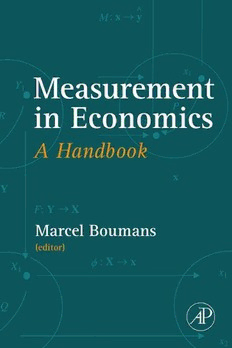Download Measurement in Economics. A Handbook PDF Free - Full Version
Download Measurement in Economics. A Handbook by Boumans M. (ed.) in PDF format completely FREE. No registration required, no payment needed. Get instant access to this valuable resource on PDFdrive.to!
About Measurement in Economics. A Handbook
Measurement in Economics: a Handbook aims to serve as a source, reference, and teaching supplement for quantitative empirical economics, inside and outside the laboratory. Covering an extensive range of fields in economics: econometrics, actuarial science, experimental economics, index theory, national accounts, and economic forecasting, it is the first book that takes measurement in economics as its central focus. It shows how different and sometimes distinct fields share the same kind of measurement problems and so how the treatment of these problems in one field can function as a guidance in other fields. This volume provides comprehensive and up-to-date surveys of recent developments in economic measurement, written at a level intended for professional use by economists, econometricians, statisticians and social scientists.The approach is multi-disciplinary, chapters are written by experts in different fields: econometrics, economic policy, economics, history of science, metrology, and philosophy of science. One of its main results is that it bridges traditionally two distinct approaches: Representational Theory of Measurement with its close connections to experimental economics measurement in a laboratory and Econometrics with its long and rich history of dealing with passive observations measurement outside a laboratory. This bridge is built by expanding the Representational Theory of Measurement to include measurement practices in Econometrics, and other fields of economics.The central measurement problem is to obtain reliable quantitative information about economic phenomena. The organization of this Handbook follows the framework that is given by splitting this measurement problem into three parts: invariance, accuracy and precision.
Detailed Information
| Author: | Boumans M. (ed.) |
|---|---|
| Publication Year: | 2007 |
| Pages: | 459 |
| Language: | English |
| File Size: | 4.388 |
| Format: | |
| Price: | FREE |
Safe & Secure Download - No registration required
Why Choose PDFdrive for Your Free Measurement in Economics. A Handbook Download?
- 100% Free: No hidden fees or subscriptions required for one book every day.
- No Registration: Immediate access is available without creating accounts for one book every day.
- Safe and Secure: Clean downloads without malware or viruses
- Multiple Formats: PDF, MOBI, Mpub,... optimized for all devices
- Educational Resource: Supporting knowledge sharing and learning
Frequently Asked Questions
Is it really free to download Measurement in Economics. A Handbook PDF?
Yes, on https://PDFdrive.to you can download Measurement in Economics. A Handbook by Boumans M. (ed.) completely free. We don't require any payment, subscription, or registration to access this PDF file. For 3 books every day.
How can I read Measurement in Economics. A Handbook on my mobile device?
After downloading Measurement in Economics. A Handbook PDF, you can open it with any PDF reader app on your phone or tablet. We recommend using Adobe Acrobat Reader, Apple Books, or Google Play Books for the best reading experience.
Is this the full version of Measurement in Economics. A Handbook?
Yes, this is the complete PDF version of Measurement in Economics. A Handbook by Boumans M. (ed.). You will be able to read the entire content as in the printed version without missing any pages.
Is it legal to download Measurement in Economics. A Handbook PDF for free?
https://PDFdrive.to provides links to free educational resources available online. We do not store any files on our servers. Please be aware of copyright laws in your country before downloading.
The materials shared are intended for research, educational, and personal use in accordance with fair use principles.

